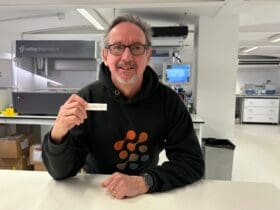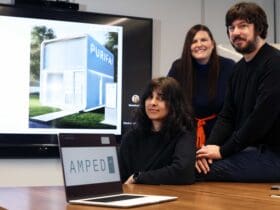Organic micronutrient startup, BIOVIT, has secured £1.5 million in Innovate UK funding to shake up the fortified foods industry with pioneering research on the bioavailability of micronutrients and develop the world’s most precise AI-powered personalised nutrition system, scheduled for NHS trial in 2025.
Spearheading the ‘Natural Nutrient Revolution’ in fortified foods, BIOVIT is the world’s first company to clinically develop and test natural vitamin and mineral blends, extracted from organic plants and fungi, for use in fortified foods, whilst guaranteeing stability of its micronutrient composition – meaning declared nutrient levels are present after processing and at the end of a product’s shelf life.
In 2025, UK consumers will for the first time see organically fortified products on their supermarket shelves, with BIOVIT already in live New Product Development (NPD) with over 10 of the UK’s largest organic and natural food brands.
“All fortified foods,” says BIOVIT founder and CEO, Ky Wright, “including breakfast cereals, meal replacement shakes, plant-based milks, and more, currently contain synthetic vitamins and minerals. Although similar, these lab-made, isolated vitamin and mineral analogues are most often structurally and functionally different to the natural versions, being less bioavailable and efficacious. From independent research commissioned by BIOVIT, we know the vast majority of consumers (77 percent) aren’t aware that synthetic micronutrients are currently being added to enhance the nutritional value of their foods, while virtually all consumers (90 percent) would prefer natural nutrients to synthetic if given the choice. BIOVIT exists to give consumers that choice.”
“At BIOVIT, we want to offer a completely natural solution to food companies – especially those that are striving towards organic certification – and expect to see a growth in ‘natural fortification’ across the food industry.”
£500k of the Innovate UK funding has facilitated a partnership with Swansea University, allowing BIOVIT to conduct research to measure the difference in bioavailability and efficacy between natural vitamins & minerals and their synthetic counterparts.
“We now know that in many cases, synthetic micronutrients are not as effective as the ones that occur naturally in plants, fungi and algae. This was demonstrated recently by a major observational study of 400k people in the US, which found no impact on mortality rates from long-term synthetic multivitamin use. The results of our UK clinical trial, directly comparing synthetic micronutrients with BIOVIT’s natural micronutrients, will be published in 2025 and could lead to radical changes in consumer awareness and acceptance of synthetic nutrients. That’s why our advice to food companies is to switch to natural nutrients now, or risk losing consumer trust.” says Ky.
In a second world first, an additional £1M from Innovate UK and a partnership with leading biomedical AI developers, Pharmatics, will enable BIOVIT to utilise the data from its 24-month bioavailability study to develop and train a pioneering AI-powered nutrition system.
Scheduled for NHS trial in 2025, the programme will measure individuals’ micronutrient absorption levels and utilisation rates, and using AI, can profile their metabolic type and nutritional needs and formulate a personalised nutrition product accordingly, making it the first personalised nutrition system in the world to match nutrition product formulations to micronutrient-metabolism types.
Empowering consumers with information relating to their personal nutritional needs and metabolism type will not only help identify deficiencies, but also reduce the risk of vitamin overdosing and any associated side-effects.
Felix Agakov, CEO at Pharmatics explains how this system will be a first-of-its-kind: “Our approach is unique because it combines large-scale scientific evidence with personal health data to deliver highly tailored nutritional interventions.
“Combining evidence from multiple relevant worldwide trials with personal data will create nutrition plans that are safer and more effective than one-size-fits-all approaches and methods that only learn from small datasets from individual clinical trials.”








Leave a Reply
View Comments